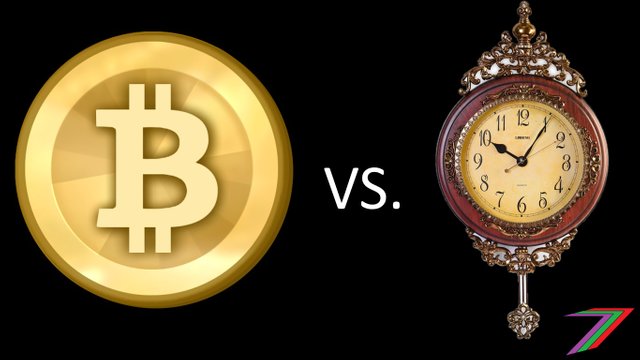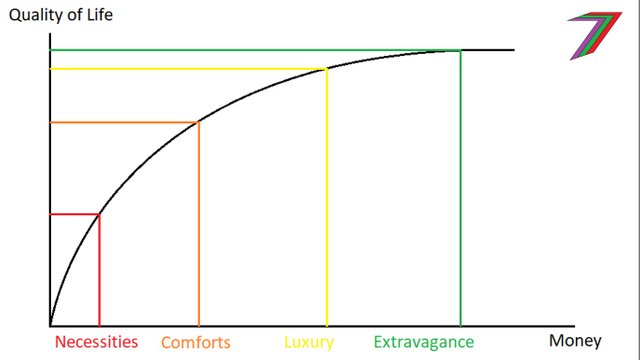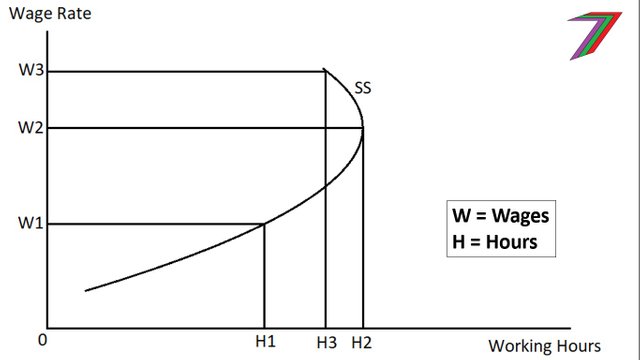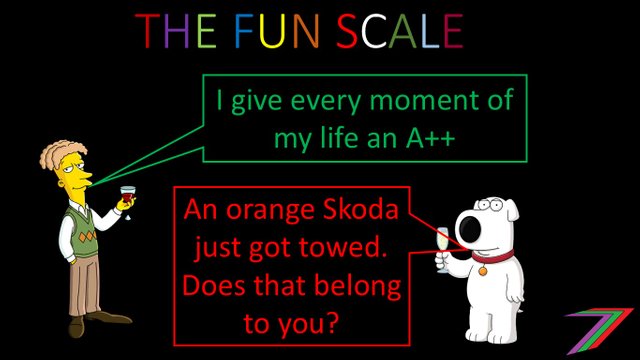Hi Everyone,

In this post, I will be explaining my perspective and ongoing research in regards to valuing life in terms of quality of time. Value, of almost anything, is typically represented as a monetary value. Having more money (purchasing power) is usually perceived to be an improvement over having less money. The sacrifice to obtain that money is often given less concern. That sacrifice is often in terms of quality of time. To acquire more money typically requires a person to work to earn an income. The level of satisfaction obtained from a job varies from person to person. However, most people would agree that working is generally not their preferred activity. There are other activities, which they would prefer to be doing. Therefore, working to earn money comes at a sacrifice. Does the cost of the sacrifice exceed the benefit obtained from acquiring the money? Having less money and more time to enjoy activities that give greater pleasure could be a better option for many people.
Valuing in time

I have mentioned in several of my posts and videos that time is a better measure of value than money. To articulate that a little further, value can be even better measured as quality of time. The duration of our lives are measured in time and how we experience that determines our quality of life. Our actions can improve our quality of time in the present and/or in the future. For example eating a sandwich. If the sandwich tastes nice, we are improving our quality of time in the present. The sandwich addresses our hunger and therefore improves are quality of time several hours beyond the period required to consume the sandwich.
People need to decide how they want to use their time. How focused should they be on improving time experienced in the present compared to time they expect to be experiencing in the future. Future expected experiences could be considered in the short-run, medium-run, long-run and across different periods. Expected future experiences are also uncertain. A future experience planned to occur in a particular way could turn out to be completely different.
Money adding value

People acquire money for several reasons. Most typically, money is acquired to increase purchasing power. More money enables the purchase of more or higher quality products or services. Money can also be used to elevate a person’s status in society. This can be from the earning of money itself or from the methods of acquiring money. High earning jobs often bring with them a higher status and image of success to society. Having money can offer greater freedom; people can take more time away from work or even leave a job with less worry about financial obligations. Money can allow people to support charitable causes and offer help to those that are lacking in financial resources; this is sometimes referred to as psychic income obtained from altruism. The acquisition of money also makes it easier to acquire more money to be used to continue the activities as described above.
Having money can certainly add value to person’s life. However, how much money is required to add sufficient value to your life. A basic amount of money is required to obtain the essentials of living such as food, water, shelter, power, and sanitation. Additional money is required to address certain wants that are not essential but add great value to life. Even more money is required to be able indulge in certain luxuries. Money has a diminishing marginal utility. As we acquire more money, the less value each additional unit of money adds to the quality of our lives. This can be expressed in Figure 1.
What can money get you?

Note: this a rough depiction of declining satisfaction from accumulation of monetary wealth
Figure 1 breaks down what money can buy in relation to the impact it has on quality of life. I have used and defined four categories of goods and services that can be acquired with money. They are as follows.
- Necessities
- Comforts
- Luxury
- Extravagance
Necessities are the basic needs such as food, water, shelter, clothing, footwear, power, and sanitation. Comforts are wants that make life more enjoyable but you will not die without them. These wants could include modern appliances, variety of clothes, tasty and nutritious food, mobile phone, motor vehicle and furniture. Luxuries are goods and services that serve beyond typical needs and wants. Luxuries could include travelling abroad, high-end brands (e.g. clothes, watches, shoes, and wine), jewellery, specialty restaurants and limousine services. Extravagance is luxury to the extent of opulence. Extravagance could include exotic cars, yachts, mansion, travelling in private jets, tailored designer fashion accessories, and high-end designer jewellery.

There is flexibility in regards to what fits into each category. As affluence increases, many of the luxuries will be considered comforts and many comforts will be considered necessities. A mobile phone is a perfect example of a comfort that many now define as a necessity.
Value beyond money

As discussed in the previous section, access to money can be used to improve the quality of life. These improvements are still subject to several conditions. Economists assign a value of utility based on the acquisition of a particular good or service. This value does not consider the available time to utilise this good or service. A person may acquire a luxury car but rarely drives or even sees that car. This person may only achieve satisfaction from the knowledge of possessing such a vehicle rather than enjoyment of using that vehicle. If time is not available to enjoy purchases, the value these purchases add to a person’s quality of life is limited. This lack of value will become more apparent as a person accumulates more items.
What money does not buy?

Money cannot buy everything. Money cannot buy happiness. Money can provide the means to obtain greater happiness, which is not a guarantee of happiness. There are many guides and books prescribing how to achieve happiness. Most of this material does not recommend dedicating your life to accumulating as much wealth as possible. Instead, the most likely key to happiness is a combination of using what you can buy, who you can spend time with, where you spend this time, reducing stress, maintaining good health (physical and mental). The pursuit of more money can become a hindrance to achieving happiness if it prevents or restricts how you use your time or creates stress that limits your capacity to enjoy life.
Paradox of happiness (Easterlin Paradox)

I want to introduce briefly an observation made regarding financial wealth (money) and happiness. Richard Easterlin in his many academic papers has researched the correlation between happiness and wealth. His research has often led him to the conclusion that increased financial wealth does not increase happiness overtime (longitudinal studies). Instead, financial wealth increases happiness amongst people living in the same period as well as geographical location. It appears that financial wealth increases happiness if that financial wealth is relatively higher than that of the rest of the community. This raises the question of the extent that increased purchasing power adds to happiness compared to social status obtained from higher financial wealth.
Backward bending supply curve of labour

I also want to introduce the backward bending supply. In theory, a backward bending supply curve can occur for the labour market once the wage rate reaches a particular value. At this point, workers realise that they would rather spend their time engaging in activities other than work (leisure). The additional income from working longer hours adds little value to their life compared to the value they could obtain doing something that is not work. Figure 2 contains the backward bending supply curve.
Figure 2: Backward Bending Supply Curve

The backward bending supply curve also supports my argument in regards to valuing quality of time. I will write a more detailed post regarding the backward bending supply curve another time. If you want to learn more about the backward bending supply curve, I recommend that you read ‘Backward Bending Supply of Labour’. This article, written by a student, is informative and provides a good basic technical explanation.
Measuring quality of time

As an economist, I am drawn to finding ways to measure things. Economists typically look to provide a monetary value. Considering the flaws of measuring quality of life and happiness as a monetary value, I am proposing measuring in quality of time. I have previously worked on algorithms to display the relationships between utility/satisfaction/happiness to time, activity, and purchasing power as well as the externalities of our actions. I intend to experiment with the algorithms in a model. The model parameters will require considerable testing. I will dedicate a post to explaining this algorithm. This will be a very technical post.
I believe quality of time should be measured in regards to the activity as well as how that activity is experienced over a period of time. What activities does a person engage in on a daily basis? How much enjoyment or satisfaction does a person obtain from these activities? For example, imagine that a person engages in the following activities in a day.
- Travelling (2 hours)
- Working in office (8 hours)
- Sleeping (7 hours)
- Household chores (2 hours)
- Eating and drinking (2 hours)
- Relaxing (2 hours)
- Socialising (1 hour)
A person could assign a score between 1 and 10 for the level of enjoyment obtained from these activities. For example, if a person scored the above activities as follows.
- Travelling (3 out of 10)
- Working in office (4 out of 10)
- Sleeping (6 out of 10)
- Household chores (2 out of 10)
- Eating and drinking (7 out of 10)
- Relaxing (8 out of 10)
- Socialising (8 out of 10)
This person would have a weighted daily score of approximately 5.1 out of 10. The low score of 4 from working 8 hours in the office pulls the weighted average score down. If this person enjoyed their work, therefore assigned a score of 7, the daily score would increase to 6.1 out of 10.
A person does not engage in the same activities every day. The example given above resembles a working day. What about non-working days? Time consumed by working could have been used for other more enjoyable activities. A higher income should enable greater options for those non-working days. A person could choose to have a lower level of satisfaction on working days to obtain a higher level of satisfaction on non-working days. A person needs to decide if the sacrifice of working more hours or having a less enjoyable job is worth the sacrifice to improve the quality of the time not spent working.
Second and third party effects

As part of my work, I will be looking at the effects (positive and negative) on second and third parties from time engaging in paid work as well as time not spent at work. For example, a person could make chairs. The chair-maker (chairbler) will get some level of enjoyment from making chairs and will receive money in exchange for the chairs. This money can be used to add value to the chair maker’s life in some other way. The chair-maker makes decisions based on his own level of satisfaction. The person who buys the chair also benefits; that is why they bought the chair in the first place. In economics, this is called consumer surplus. The chair-maker can go and spend his spare time with his family and friends. If the chair-maker is a likable person, he could be adding value to the lives of the people through his socialising and interaction.
Conclusions

I believe many people do not intuitively assess value in regards to time; this could lead to more effort being placed in pursuing increased financial wealth to obtain more purchasing power. The emphasis of society on material wealth adds to the distortion of this perception. My work in regards to measuring value in terms of quality of time should provide an indication of how well people are utilising their time as well as how patterns of behaviour can be influenced to improve quality of life.
I also aim to incorporate my work, in regards to quality of time, in my ‘Cruelty-free’ economics series. This work is still in its infancy and is therefore currently treated as a standalone area. I will have several more posts to come in regards to quality of time. I hope you found this post informative.
Post Beneficiaries
The beneficiaries of this post based on the top three upvotes of the previous post are:
Each beneficiary will receive 20% of the post payout. Thanks for your support.
A fourth beneficiary has not been added because of the lack of engaging comments in the previous post. I am quite surprised how difficult it is to giveaway money on Steem.
To learn more about post beneficiaries you can read my post using the following link.






Congratulations:
You are beneficiaries for the following post.
Downvoting a post can decrease pending rewards and make it less visible. Common reasons:
Submit
You pretty much explained some of the reasons why with this article.
I think in the larger scheme of things, the issue is that people hear about Steem as social media with rewards, then they hear about the quick success stories, then they sign up thinking that they're the "next big thing" in social media, and then reality smacks them hard in the face. It's as if they create the false impression in their minds that money always has constant (instead of diminishing) marginal value relative to quality of life while they're on Steemit, and when they finally come to terms to the fact that they were wrong, they give up and go back to their old social media ways. They tried, and figured out (in their minds) that Steemit isn't worth their time and effort, that it has brought their weighted quality of life down compared to what they were doing before.
Also most ordinary people don't think in terms of a utility-based system like you've described because it's either impractical or because they aren't aware that such a system exists. For instance, I'm here writing up this comment after having read through your article because I'm not particularly busy with anything else at the moment and there's nothing else that I feel that I urgently need to do right now. But if you had posted this article exactly 23 hours prior to when you did, I would've been feeling too busy to even bother to comment. Instead of taking the time to read through your entire article now, 23 hours ago I would've just skimmed it, delivered an upvote, and probably forgotten about it completely by now.
In the end, it comes down to how we value our time in the moment. It just happens to be that right now, I believe my time is being well-spent to make this comment. Many others believe that they would be wasting their time to read your article or to make the effort to search for this information.
Downvoting a post can decrease pending rewards and make it less visible. Common reasons:
Submit
Hi @doughtaker, thanks for taking the time to read and comment on my post. People on this platform are too focused on churning out content than enjoying other people's content. I think that is a product of the reward system as well as the way Steemit has been advertised to potential users. I would say that 99% of those that join Steem will make very little money here. The trending page is very misleading with high payouts, someone new here will not immediately know that most of the high votes are bought.
You make a very good point regarding the changing value of time. When you are busy, time is scarce therefore prioritising activities is a lot more important than when you are less busy. I find that people often make themselves unnecessarily busy. This could be because of lack of planning or because to much attention is paid to 'noise'.
Downvoting a post can decrease pending rewards and make it less visible. Common reasons:
Submit
What a great read... what's alarming is how your breakdown of time spent in a day is pretty typical of your ordinary workaday person.
As I see it working hard early on and getting a passive income going is the most effective way of buying time in the future.
I agree about the backward bending curve.... if we spend too long working we end up spending more just to sustain this, which is completely irrational!
Posted using Partiko Android
Downvoting a post can decrease pending rewards and make it less visible. Common reasons:
Submit
I was reflecting on my average work day when I worked in the city; I had about 3 hours travel a day instead of 2. With five work days a week going into the city, there is very little time to do much else. Weekends also tend to get filled with various activities as well. I think in all, it turns out to be less than one full day a week off.
Downvoting a post can decrease pending rewards and make it less visible. Common reasons:
Submit
I've found the same.. and if you factor in the time it takes you to work to pay for the transport it gets worse.
Now I've (just very recently) semi-retired I really need to hit the frugality... bit of an experiment for the winter!
Posted using Partiko Android
Downvoting a post can decrease pending rewards and make it less visible. Common reasons:
Submit
Fantastic post, and something that I spend (too long!) thinking about..!
You are right that so few people think about the 'exchange' that they are making when they work for money. It is almost like people are sleepwalking. When you take the time to really think about it, we are sacrificing too much of our lives for money to buy consumer stuff (that doesn't make us happy)
Time to snap out of it. Thanks for sharing :)
Posted using Partiko Android
Downvoting a post can decrease pending rewards and make it less visible. Common reasons:
Submit
I think people need to take a step back and really think about what is most important in life. How does money factor into any of those things.
I think most will be surprised that beyond basic needs, money and material things do not add that much value.
Downvoting a post can decrease pending rewards and make it less visible. Common reasons:
Submit
Upvoted.
Downvoting a post can decrease pending rewards and make it less visible. Common reasons:
Submit
Thanks for the upvote.
Downvoting a post can decrease pending rewards and make it less visible. Common reasons:
Submit
ll
Downvoting a post can decrease pending rewards and make it less visible. Common reasons:
Submit
Hi @spectrumecons!
Your post was upvoted by @steem-ua, new Steem dApp, using UserAuthority for algorithmic post curation!
Your UA account score is currently 4.470 which ranks you at #1955 across all Steem accounts.
Your rank has improved 21 places in the last three days (old rank 1976).
In our last Algorithmic Curation Round, consisting of 181 contributions, your post is ranked at #61.
Evaluation of your UA score:
Feel free to join our @steem-ua Discord server
Downvoting a post can decrease pending rewards and make it less visible. Common reasons:
Submit
Oh, I'm in the top 2,000. Slowly making progress.
Downvoting a post can decrease pending rewards and make it less visible. Common reasons:
Submit
I upvoted your post.
Best regards,
@Council
Posted using https://Steeming.com condenser site.
Downvoting a post can decrease pending rewards and make it less visible. Common reasons:
Submit
Ok, thank you.
Downvoting a post can decrease pending rewards and make it less visible. Common reasons:
Submit
Downvoting a post can decrease pending rewards and make it less visible. Common reasons:
Submit
I really liked this article, thank you for sharing. If you want to get a greatly written essay Click here
Downvoting a post can decrease pending rewards and make it less visible. Common reasons:
Submit
I agree with much of what you say and would like to suggest you join me in solving poverty with a price tag coupon that uses "hours of your personal time" as a unite of exchange currency in a free market. I'd like you to help me promote the hOEP project on Steamit if you are interested. I'm kind of new to steemit and spend most of my time on other project initiatives.
Anyway, in a short example, how does time value accounting and pricing work? Consider this example.
A toll bridge saves everyone 1 hour of time compared to the next best option. what is the price the toll bridge owner should charge for the use of the toll bridge to 3 people who earn 1@$10/hr, 1@$50/hr, and 1@$200/hr?
Answer: to make the most profit, the toll bridge should charge the maximum each customer is willing to pay which is based on their individual $/hr rate. The toll bridge should charge 1@$10, 1@$50, and 1@$200. So the lesson is don't charge everyone the same price because that doesn't make as much profit as charging more to rich people and less to poor people.
um, this is actually explained better in slideshows and stuff that I want you to consider and promote. if this is interesting here's the URL for for the project at https://sites.google.com/view/the-hoep-project/home
Downvoting a post can decrease pending rewards and make it less visible. Common reasons:
Submit
I think I encountered this information a while back but I will take a look again, thanks.
Downvoting a post can decrease pending rewards and make it less visible. Common reasons:
Submit
wonderful tips you've written. I'm going to apply
these in my regural life. Hopefully, it should increase quality of the life
https://essaywritingsolutions.co.uk/
Downvoting a post can decrease pending rewards and make it less visible. Common reasons:
Submit
Hi, @spectrumecons!
You just got a 12.93% upvote from SteemPlus!
To get higher upvotes, earn more SteemPlus Points (SPP). On your Steemit wallet, check your SPP balance and click on "How to earn SPP?" to find out all the ways to earn.
If you're not using SteemPlus yet, please check our last posts in here to see the many ways in which SteemPlus can improve your Steem experience on Steemit and Busy.
Downvoting a post can decrease pending rewards and make it less visible. Common reasons:
Submit
That's awesome, thanks.
Downvoting a post can decrease pending rewards and make it less visible. Common reasons:
Submit